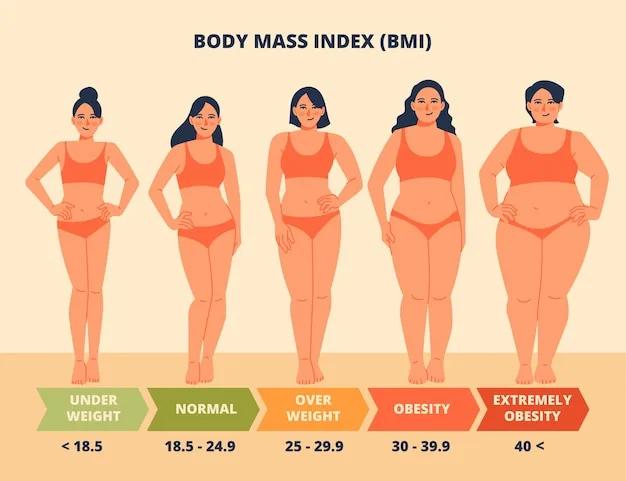Malnutrition is a global health issue that encompasses various forms, including undernutrition, micronutrient deficiencies, overnutrition, weight gain, obesity, and diet-related noncommunicable diseases. It affects individuals of all ages and can have serious consequences on health, and well-being. In recent studies, the relationship between low body mass index (BMI) and malnutrition in adults has been explored, highlighting the risks associated with these conditions. By delving into the research conducted on this topic, we can gain a better understanding of the impact of low BMI and malnutrition on adults’ health and morbidity rates.
What is malnutrition?
Malnutrition refers to the deficiencies, excesses, or imbalances in a person’s intake of energy and/or nutrients. It encompasses undernutrition (including wasting, stunting, and being underweight), inadequate vitamin, supplement or mineral intake, being overweight, obesity, and diet-related comorbidities, including cardiovascular diseases such as heart disease, heart attacks and stroke, and is often linked with high blood pressure. These different manifestations of malnutrition can have severe consequences on an individual’s health and development.
The prevalence of low BMI and malnutrition
The World Health Organization (WHO) estimates that 1.9 billion adults worldwide are overweight or obese, while 462 million are underweight. These figures underscore the significant global public health burden of malnutrition. In 2020, approximately 149 million children under the age of 5 were stunted, 45 million were wasted, and 38.9 million were overweight or obese. It is evident that malnutrition affects individuals across the age spectrum, from the youngest to the oldest.
Understanding undernutrition
Undernutrition comprises different sub-forms, including wasting, stunting, underweight, and deficiencies in vitamins and minerals. Wasting refers to low weight-for-height, often indicating recent and severe weight loss due to inadequate food intake or infectious diseases. Stunting, on the other hand, results from chronic or recurrent undernutrition, typically associated with socioeconomic conditions, maternal health, and inappropriate infant and young child feeding practices. Underweight children may exhibit stunting, wasting, or both.
The health risks associated with low BMI
Low BMI is not simply a reflection of thinness in patients; it also serves as an indicator of potential health risks. BMI is an estimate of your body fat based on your height and weight. When an individual’s BMI falls below the normal weight range, their body may lack essential nutrients and energy, leading to a weakened immune system and impaired physiological functions. The consequences of low BMI extend beyond physical health, as it can impact cognitive development, productivity, and overall well-being. Moreover, undernutrition contributes to frailty, dependence, decreased quality of life, and reduced life expectancy. Insufficient nutrient intake and compromised assimilation can lead to altered body composition, such as loss of muscle mass, body weight changes, impaired immune function, increased risk of falls and fractures, and higher susceptibility to infectious episodes.
Impact on physical health
Individuals with low BMI are more susceptible to a range of health issues. The lack of adequate nutrition and calorie intake weakens the immune system, making underweight individuals more prone to infections and illnesses. Furthermore, low BMI can lead to nutrient deficiencies, resulting in various complications such as anemia, weakened bones, and impaired organ function. These health risks highlight the urgent need to address undernutrition and prevent the severe consequences associated with low BMI.
Cognitive development and productivity
In addition to physical health, low BMI can have detrimental effects on cognitive development and productivity. Malnutrition, particularly during crucial periods of growth and development, can impair brain function and hinder cognitive abilities. This can lead to poor academic performance, decreased productivity, and limited opportunities for personal and professional advancement. Addressing low BMI and providing adequate nutrition is essential for unlocking the full potential of individuals and societies.
Psychological well-being
It is important to recognize that low BMI can have psychological implications as well. Individuals who are underweight may experience feelings of low self-esteem, body image dissatisfaction, and social isolation. The psychological toll of the double burden of malnutrition should not be underestimated, as it can further exacerbate the already challenging physical and cognitive consequences associated with low BMI.
Causes and contributing factors
Understanding the causes and contributing factors to low BMI is crucial in developing effective strategies to combat nutritional risk. While the root causes of undernutrition can be complex and multifaceted, several key factors play a significant role in contributing to low BMI in adults.
Socioeconomic factors and poverty
Poverty is a major determinant of undernutrition and low BMI. People living in poverty often lack access to an adequate and diverse diet, as well as essential healthcare services. Poverty also limits educational opportunities, which can perpetuate the cycle of undernutrition and hinder individuals from breaking free from the constraints of low BMI.
Inadequate food availability and access
Limited access to nutritious and diverse foods is a widespread issue contributing to low BMI. Food insecurity, which refers to the lack of consistent access to sufficient and healthy food, is a primary driver of undernutrition. Inadequate food availability and access can stem from various factors, including geographic isolation, high food prices, and limited agricultural productivity.
Cultural and societal influences
Cultural and societal norms surrounding food and body image can also contribute to low BMI. In some cultures, thinness may be idealized, leading to unhealthy behaviors and restrictive eating patterns. Additionally, social pressures and unrealistic beauty standards can perpetuate disordered eating habits and contribute to undernutrition.
Health conditions and chronic diseases
Certain health conditions and chronic diseases can contribute to low BMI in adults. Chronic diseases, such as cancer, gastrointestinal disorders, type 2 diabetes and metabolic disorders, can lead to reduced appetite, impaired nutrient absorption, and increased energy expenditure. These factors can result in unintentional weight loss and undernutrition.
The impact of low BMI and malnutrition on older people
While malnutrition affects individuals of all ages, older adults, in particular, are vulnerable to its consequences. The issue of overweight and obesity in the older population is a growing concern, given the increasing number of overweight and obese individuals worldwide. However, recent studies have highlighted that low BMI and malnutrition, rather than obesity, pose a higher risk for older adults, especially in the context of COVID-19.
During the COVID-19 pandemic, researchers at Karolinska Institutet conducted a study on hospitalized geriatric patients. They found that low BMI and malnutrition were a greater predictor of increased in-hospital mortality among older adults with COVID-19. This finding was particularly pertinent for geriatric patients aged 75 years and older. In contrast, obesity did not emerge as a risk factor for COVID-19 infection among older patients. These results challenge the common perception that obesity is a primary risk factor for severe COVID-19 outcomes in all age groups.
Exploring the role of body composition and nutritional status
To better understand the relationship between body composition, nutritional status, and COVID-19 pathology in older adults, researchers conducted a systematic review between BMI, nutritional status (assessed using the Mini Nutritional Assessment-Short Form (MNA-SF) screening tool) and in-hospital mortality. The cohort study analyzed data from medical records of approximately 10,000 patients in Stockholm during the initial two waves of the pandemic.
The study’s major finding was that indicators of undernutrition, such as low BMI (BMI<18.5) and low MNA-SF scores (0-7), were strongly correlated with short-term mortality in geriatric COVID-19 patients. Importantly, the MNA-SF scores also predicted an increased incidence of mortality in older hospitalized patients for causes other than COVID-19. This underscores the vital role of nutritional status in the overall health and well-being of geriatric patients.
Addressing malnutrition in geriatric care
The study’s findings highlight the importance of addressing nutritional status in geriatric care, especially in the context of COVID-19. While obesity has been a known risk factor for various health conditions, including COVID-19 in younger adults, the research emphasizes the significance of low BMI and malnutrition in older adults. Therefore, healthcare professionals must prioritize the assessment and management of nutritional status in geriatric patients to improve patient outcomes and reduce mortality rates.
Promoting optimal nutrition early in life is crucial, as the first 1000 days from conception to a child’s second birthday lay the foundation for long-term health and well-being. However, the focus on nutrition should not end in childhood but continue throughout adulthood and into old age. Elderly individuals, especially those living in low-income countries, are at a heightened risk of malnutrition due to socioeconomic factors, limited access to healthy food, and age-related changes in appetite and dietary intake.
The global effort to combat malnutrition
Malnutrition is a global health challenge that necessitates a comprehensive and collaborative approach. The United Nations (UN) has declared 2016-2025 as the Decade of Action on Nutrition, aiming to address all forms of malnutrition and achieve global nutrition targets. The UN Decade of Action on Nutrition emphasizes the importance of sustainable and resilient food systems, social protection, nutrition-related education, and aligned health systems to meet these targets.
The World Health Organization (WHO) plays a critical role in combatting malnutrition by working with member states and partners to ensure universal access to adequate nutrition interventions and healthy diets. WHO develops evidence-informed guidance based on scientific and ethical frameworks, advocates for policy priorities, supports the implementation of nutrition interventions, and monitors progress towards nutrition goals.
Conclusion: Prioritizing nutrition for better health outcomes
Understanding the link between low BMI, malnutrition, and health outcomes is crucial for improving the overall well-being of individuals, particularly older adults. While obesity has been widely recognized as a risk factor for various health conditions, recent research highlights the significance of low BMI and malnutrition in older adults, particularly in the context of COVID-19.
Healthcare professionals must prioritize the assessment and management of nutritional status in geriatric patients, as undernutrition can have severe consequences for this population. Promoting healthy nutrition throughout the lifespan, from early childhood to old age, is essential for preventing malnutrition and its associated health risks.
As the global community continues its efforts to combat malnutrition, it is vital to address the underlying socioeconomic factors that contribute to nutritional disparities. By implementing sustainable food systems, providing social protection, and improving nutrition-related education, we can create a healthier future for all individuals, regardless of age or socioeconomic status.
Sources
- Malnutrition – NHS
- Prevalence of Undernutrition and Risk of Undernutrition in Overweight and Obese Older People – PMC
Medical Disclaimer
NowPatient has taken all reasonable steps to ensure that all material is factually accurate, complete, and current. However, the knowledge and experience of a qualified healthcare professional should always be sought after instead of using the information on this page. Before taking any drug, you should always speak to your doctor or another qualified healthcare provider.
The information provided here about medications is subject to change and is not meant to include all uses, precautions, warnings, directions, drug interactions, allergic reactions, or negative effects. The absence of warnings or other information for a particular medication does not imply that the medication or medication combination is appropriate for all patients or for all possible purposes.








